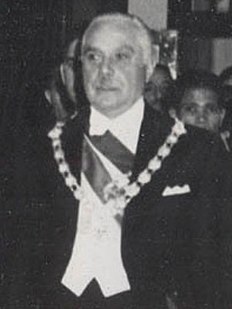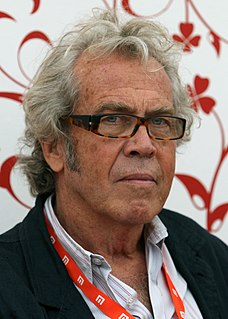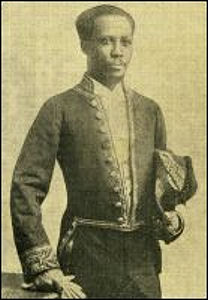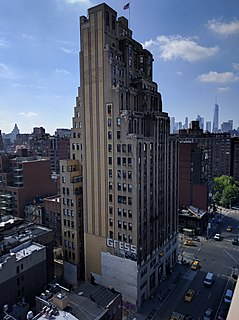
The recorded written history of Haiti began on 5 December 1492 when the European navigator Christopher Columbus happened upon a large island in the region of the western Atlantic Ocean that later came to be known as the Caribbean. It was inhabited by the Taíno, and Arawakan people, who variously called their island Ayiti, Bohio, or Kiskeya(Quisqueya). Columbus promptly claimed the island for the Spanish Crown, naming it La Isla Española, later Latinized to Hispaniola. French influence began in 1625, and French control of what was called Saint-Domingue—modern-day Haiti—began in 1660. From 1697 on, the western part of the island was French and the eastern part was Spanish. Haiti became one of the wealthiest of France's colonies, producing vast quantities of sugar and coffee and depended on a brutal slave system for the necessary labor. Inspired by the message of the French Revolution, Haitian slaves rose up in revolt in 1791 and after decades of struggle the independent republic of Haiti was officially proclaimed in 1804.

André Breton was a French writer, poet, and anti-fascist. He is known best as the co-founder, leader, principal theorist and chief apologist of Surrealism. His writings include the first Surrealist Manifesto of 1924, in which he defined surrealism as "pure psychic automatism".

François-Dominique Toussaint Louverture, also known as Toussaint L'Ouverture or Toussaint Bréda, was the best-known leader of the Haitian Revolution. He was a leader of the growing resistance. His military and political acumen saved the gains of the first Black insurrection in November 1791. He first fought for the Spanish against the French; then for France against Spain and Great Britain; and finally, he fought in behalf of Saint-Domingue in the era of Napoleonic France. He helped transform the slave insurgency into a revolutionary movement. By 1800 Saint-Domingue, the most prosperous French slave colony of the time, had become the first free colonial society to have explicitly rejected race as the basis of social ranking.

Rafael Leónidas Trujillo Molina, nicknamed El Jefe, was a Dominican politician, soldier and dictator, who ruled the Dominican Republic from February 1930 until his assassination in May 1961. He served as president from 1930 to 1938 and again from 1942 to 1952, ruling for the rest of the time as an unelected military strongman under figurehead presidents. His 31 years in power, to Dominicans known as the Trujillo Era, are considered one of the bloodiest eras ever in the Americas, as well as a time of a personality cult, when monuments to Trujillo were in abundance. Trujillo and his regime were responsible for many deaths, including between 20,000 and 30,000 Haitians in the infamous Parsley massacre.

Jean-Jacques Dessalines was a leader of the Haitian Revolution and the first ruler of an independent Haiti under the 1805 constitution. Under Dessalines, Haiti became the first country in the Americas to permanently abolish slavery. Initially regarded as governor-general, Dessalines was later named Emperor Jacques I of Haiti (1804–1806) by the Generals of the Haitian Revolution Army. He is regarded as one of the founding fathers of Haiti.

Sténio Joseph Vincent was President of Haiti from November 18, 1930 to May 15, 1941.

Juan Antonio Corretjer was a Puerto Rican poet, journalist and pro-independence political activist opposing United States rule in Puerto Rico.

Jørgen Leth is a Danish poet and film director who is considered a leading figure in experimental documentary film making. Most notable are his documentary A Sunday in Hell (1977) and his surrealistic short film The Perfect Human (1967). He is also a sports commentator for Danish television and is represented by the film production company Sunset Productions.
Jean-Baptiste Romane was an early Haitian poet and playwright. He is best known for his first work, the lyrical poem Hymne à l'Indépendance. When France announced its official recognition of Haitian independence, Romane's poem was sung at the subsequent national celebration. His works were typically historic or patriotic; many celebrated the heroes of the Haitian Revolution. For one poem, Vers à la France, Romane was awarded a gold medallion by the French government.
Coriolan Ardouin was a Haitian romantic poet. Ardouin left only one work before his early death: a compilation of poems entitled Reliques d'un Poète Haïtien, published posthumously in 1837.
Ignace Nau was a Haitian poet and storyteller. Born in Port-au-Prince, Nau studied in a renowned military school in Haiti before attending the Catholic University of New York. After returning to Haiti, Nau founded a literary society named "The School of 1836" with his brother, Emile Nau, and the Ardouin brothers, Beaubrun, Céligny, and Coriolan. Ignace Nau published the literary magazine Le Républicain, which was censored by the Haitian government and was later renamed L'Union.

Massillon Coicou was a Haitian poet, novelist, playwright, and politician. Born in Port-au-Prince, Coicou was educated in a Catholic school for boys. He was appointed as the Haitian Chargé d'Affaires Étrangères for the Haitian Republic in France, where several of his works were published. Opposed to the presidency of Pierre Nord Alexis, Coicou publicly announced his intentions to overthrow Nord Alexis' government. He and his two brothers were subsequently executed by the President's orders on the night of 14–15 March 1908.

Oswald Durand was a Haitian poet and politician, said to be "to Haiti what Shakespeare is to England and Dante to Italy." He was also a Haitian writer and poet of French and Creole expression, considered as the national poet of Haiti. Besides he was also judged as a Romantic poet and the most prolific one in the nineteen centuries. These 20th-century successors such as Rene Depestre and Jacques Romain congratulated Oswald Durand for his authentic expressions and honored him as a forerunner of Haitian indigenism. He was born in the northern part of Haiti Which has for city Cap-Haitian. In 1842 an earthquake devastated the city of Cap-Haitian which made him orphan father and mother when he was nearly two years old. Oswald Durand and her sister were welcomed to their maternal grandmother who grew them up. He spent most of his childhood outside the city where he was born. Because of the political difficulties the country was going through, he was forced to leave school and to educate himself without having recourse to a teacher. He owes the title of romantic poet thanks to one of those works that he wrote laughs and tears.

Georges Sylvain (1866–1925) was a Haitian poet, lawyer and diplomat. Born in Puerto Plata, Dominican Republic, Sylvain studied in his native city before attending school in Paris and receiving a law degree. After returning to Haiti, he founded a law school and two periodicals, La Patrie and, in 1922, l'Union Patriotique. He was a member of the literary society La Ronde and was involved in other literary activities. He published Confidences et Mélancolies (1901), a compilation of twenty-nine poems.

Etzer Vilaire was a Haitian poet and attorney.
Indran Amirthanayagam is a Sri Lankan-American poet-diplomat, essayist and translator in English, Spanish, French, Portuguese and Haitian Creole.

The 1804 Haiti massacre was carried out against the remaining white population of native French people and French Creoles in Haiti by Haitian soldiers under orders from Jean-Jacques Dessalines. He had decreed that all suspected of conspiring in the acts of the expelled army should be put to death.

















